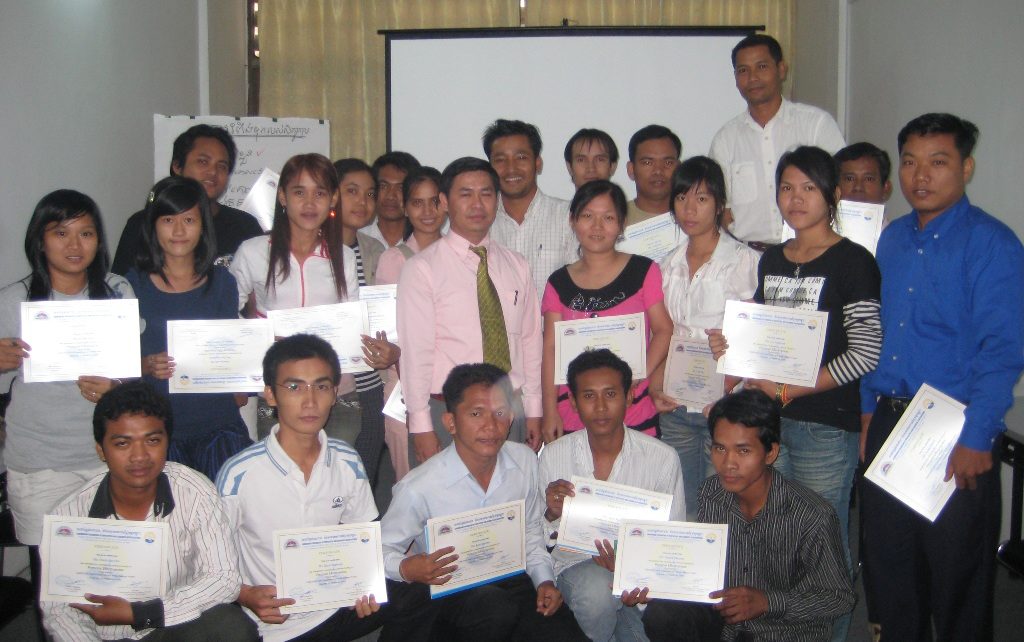Context: The ILO and Cambodia’s National Institute of Statistics carried out two rounds (2012 and 2014) of the ILO School-to-Work-Transition Survey (SWTS). The results indicated that the youth unemployment rate in 2014 stood at 2.4 per cent with no significant differences between young men and women. The rate of youth that were neither employed or in education/training declined between 2012 and 2014 from 8.7 to 7.9 per cent. Mismatches between the education system and the labour market were seen to be significant, while over 95 per cent of workers were in informal employment. Agriculture was the main economic sector for Cambodian employed youth (47.1 per cent in 2014) followed by the services sector (30.8 per cent) and industry (22.1).
Implementation of programme/ initiative: The Youth Employment and Social Dialogue Project (YEPSD Project) is a joint initiative between the Cambodian Federation of Employers and Business Associations (CAMFEBA) and ILO’s Bureau for Employers’ Activities, (ILO ACT/EMP) under the Programme on Social Dialogue funded by the Norwegian Government. The programme promotes social dialogue between all stakeholders in Cambodia involved in youth employment (government, employers, trade unions, youth associations, universities and vocational training institutions, NGOs and civil society associations).
The goal of YEPSD is to promote income opportunities for Cambodian students, and employed and unemployed youth through matching supply with demand for skills in the labour market. To that effect, YEPSD has implemented the following activities:
- Establishing the Employment Information Resources Centre (EIRC) to disseminate job opportunities.
- Implementing the Employability Skills Training Programme (ESTP) to improve youth employability as well as to meet the needs of employers. ESTP covers, inter alia, the following areas: job seeking skills, time and stress management, personal financial management, critical thinking, motivation skills and legal rights of employees. Certificates are awarded upon completion of the training course.
- Developing a knowledge base. Translation and dissemination among stakeholders of key international publications pertaining to international good practices in youth employment. Periodic surveys to understand the skills-related challenges faced by both employers and youth looking for jobs.
- Developing policies and strategies through collecting youth inputs in the design and implementation of policies that affect their future, and working with diverse stakeholders to analyse the results of surveys and make recommendations on the implementation of YEPSD.
YEPSD targets youth in Phnom Penh, Siem Reap, Sihanouk Ville, Kampong Cham and Svay Rieng province, with an annual budget of US$158,000. CAMFEBA is the implementing agency of YEPSD but it is managed by a Project Advisory Committee (PAC), which includes representatives from the Cambodian Government, employers, trade unions, NGOs, donor agencies, and educational institutions. PAC oversees the implementation, stakeholder coordination, development, expansion, monitoring, and evaluation of YEPSD.
Main challenges: YEPSD is an ambitious project, the first time that a project of such scale has been attempted in Cambodia. In addition to financial challenges, YEPSD has faced a number of logistic challenges affecting all stakeholders:
- On the youth side: It has been difficult to locate and gather data from unemployed youth because they most often remain at home, helping with housework and not usually joining youth networks or associations (particularly in the countryside). Moreover, those collecting data from such youth require time out of their jobs and, often, permission from managers.
- On the employer side: Senior managers needed to fill in employer surveys, but may have lacked the time or inclination to do so. In addition, with the survey being unprecedented, some employers, unsure of how the information would be used, were reluctant to participate. In the provinces, employers were difficult to contact and did not see the relevance or benefit of completing the survey.
- With respect to vocational training schools: This was particularly so in the provinces where the number of providers was very limited.
Results achieved: Over 1,800 young people have been trained by YEPSD, which has also provided job counselling regarding inquiries related to jobs opportunities, and conducted consultation workshops and events in youth centres and universities in Phnom Penh. Furthermore, the EIRC has disseminated information related to youth employment.
A Youth Employment Network (YEN) has been established to build youth capacity and gather inputs on policies and strategies on youth employment at the local, provincial and national level. YEPSD has also published several reports, guidelines, job seeking manuals, and newsletters on issues related to skill training and youth employment.
Moving Forward: Despite the positive results achieved by YEPSD, the programme cannot expand its coverage and scope because of budget constraints and the inability to attract funding from other donors. CAMFEBA is member of many government advisory committees on issues related to youth employment and TVET, such as the National Training Board, the Educational Bodies Committee, and the Inter-Ministerial Committee for Reviewing and Preparing National Employment Policy. As a consequence, CAMFEBA plans to use its membership in these committees to advocate for greater attention to issues related to youth employment and to potentially consolidate and expand YEPSD activities. In addition, CAMFEBA continues to disseminate to youth groups, universities and other stakeholders the lessons learned from YEPSD through numerous publications.
Replicability: YEPSD has not been yet replicated elsewhere in Cambodia or abroad, in part due to financial constrains. Nevertheless, several features of YEPSD, like the social dialogue component and the surveys across stakeholders, represent innovative approaches in the promotion of youth employment that are potentially replicated elsewhere. CAMFEBA maintains regular meetings with government authorities to advocate for more effective policies that promote youth and youth employment. Likewise, every year, it organizes conferences, meetings and discussion groups about youth employment with different stakeholders in Cambodia to brainstorm on policies and strategies to improve youth employability.
References:
Background Information on Cambodia’s school-to-work transition. Cambodia’s School-to-work Transition 2012-2014 Survey (2016). Cambodia’s National Institute of Statistics and International Labor Organization (ILO).
ttp://www.ilo.org/wcmsp5/groups/public/—ed_emp/documents/publication/wcms_537749.pdf
CAMFEBA-ILO publication. Youth and employment: Bridging the Gap. Youth employment and social dialogue project.
CAMFEBA-YEP web links related to youth employment
https://www.camfeba.com/en/project/ilo/ye-.html
Acknowledgments:
This good practice was kindly prepared by Dr. Antonio Postigo
Project Details
Date: August 30, 2017
